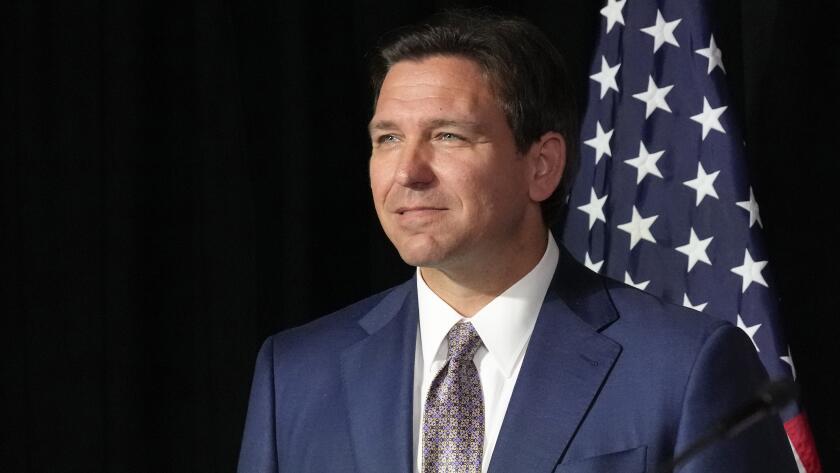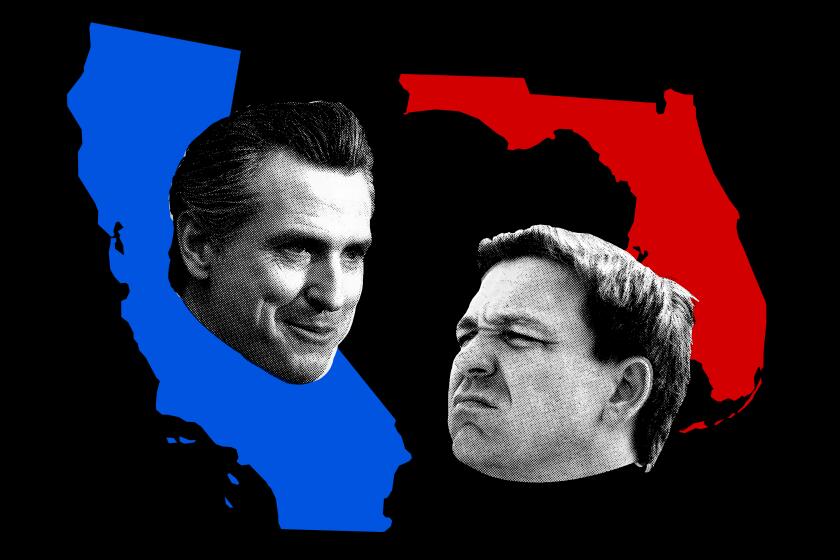Florida Gov. Ron DeSantis launches 2024 GOP presidential bid in glitchy Twitter appearance
- Share via
DeSantis formally launches his bid for the Republican presidential nomination. He seeks to become a formidable challenger to President Trump.
- Share via
WASHINGTON — Florida Gov. Ron DeSantis announced his bid for the Republican presidential nomination on Wednesday in a glitch-filled Twitter appearance — a diminished figure in his party after a steady fall in polls in recent months, but still the top rival to former President Trump.
For the record:
12:41 a.m. May 25, 2023A previous version of this report misspelled tech investor David Sacks’ last name as Sachs.
“American decline is not inevitable,” DeSantis said before a moderated discussion with Twitter owner Elon Musk and David Sacks, a tech investor, which started about 20 minutes late after multiple crashes of the website. “It is a choice. And we should choose a new direction, a path that will lead to American revitalization. We must restore sanity to our nation.”
DeSantis hit on a variety of Republican concerns about the state of the country, including several that have become his hallmarks: inflation, diversity and inclusion goals at companies and government agencies, and vaccine mandates. He promised “law and order” and constitutional government.
He also took veiled jabs at Trump, without naming him.
“Governing is not entertainment, not about building a brand or virtue-signaling,” he said, while promising to end the “culture of losing that has infected the Republican Party in recent years.”
His announcement on Twitter Spaces, and in a produced video posted on the website, was interrupted by a variety of technical problems that delayed the start time and led to several periods in which the hosts appeared to be discussing website bandwidth issues brought on by the large number of listeners.
DeSantis answered questions from friendly Republican activists and supporters and also spent several minutes condemning the news media and his critics. Sachs and Musk shared their belief that Twitter was allowing them to bypass that “bubble.”
In his brief accompanying video, DeSantis leaned on his record as Florida’s governor.
“We held the line when freedom hung in the balance,” he said. “We showed that we can and must revitalize America.”
DeSantis has tried to position himself as a culture warrior who will carry on Trump’s legacy without the attendant baggage, the former president’s attempts to overturn the 2020 election and at least one criminal indictment.
As recently as a few months ago, DeSantis was seen as a potential favorite for the nomination. The former Trump protege won reelection in November by a landslide margin in a state formerly seen as competitive. That victory came in an otherwise disappointing midterm election cycle for his party in which many candidates endorsed by Trump fared poorly.
DeSantis has appeared frequently on Fox News, touting his disdain for other media, vaccine mandates, critical race theory and a host of other targets he has labeled as “woke.” He has signed laws that restrict how U.S. history on race can be taught in schools and forced the College Board to revise its new AP African American studies curriculum.
The governors of California and Florida — two of the nation’s biggest ideological rival states — are leading in opposite directions. Both may run for president.
He even went after Disney, an essential driver of his state’s economy. The clash came after the entertainment giant criticized Florida’s “Don’t Say Gay” bill, which limits what elementary school teachers can discuss about gender and sexuality.
In response, DeSantis targeted Disney’s business operations in Florida. The state government and the company, which owns several theme parks and other businesses that fuel central Florida’s tourism, are now locked in a court battle, and Disney announced last week that it was canceling plans to open a new central Florida campus that would have employed 2,000 workers.
The strategy has gained DeSantis attention. But his poll numbers have fallen, and some donors have expressed reservations as he’s appeared to stumble.
In March, for example, he revised his description of Russia’s invasion of Ukraine as a “territorial dispute.” And some, including Trump, have criticized DeSantis for signing a six-week abortion ban in the state, among the most restrictive in the nation.
Hoping to regain momentum, DeSantis spent the last few weeks renewing his effort to hold up Florida as a model for conservatives nationwide, a key message of his campaign.
DeSantis’ supporters use the slogan: Make America Florida.
He has signed bills passed by the Florida Legislature to ban gender-affirming care for trans youth, expand private school vouchers, and gut diversity and equity programs at public colleges and universities.
California is a frequent target of DeSantis’; he often describing the liberal state as the antithesis of Florida. He has sparred with Gov. Gavin Newsom on a range of issues, including COVID-19 policy and abortion. Last July, Newsom broadcast an ad in Florida lambasting his policies.
Five years ago, DeSantis was a little-known Florida congressman who became governor in part thanks to Trump’s endorsement, a fact Trump often mentions.
The race for the 2024 GOP nomination has increasingly turned the onetime allies against each another. Trump in particular has taken aim at his chief rival, dubbing him “DeSanctimonious” and running an attack ad making fun of him for reportedly eating pudding with his fingers. Trump has also pointed to DeSantis’ prior support for curtailing entitlement programs.
Ron DeSantis made his name on culture war issues. But the new presidential candidate’s healthcare record includes running one of the least-insured states in America.
DeSantis has mostly steered clear of attacking Trump directly, though he took a sideways swipe after Trump’s recent indictment stemming from hush money paid to porn star Stormy Daniels.
Trump’s firm grip on the GOP seemed to slip after he lost the 2020 presidential race and many of his preferred candidates faltered in the 2022 midterm. But over the last two months, he has regained his place as Republicans’ favorite in polls, leading DeSantis by close to 30 percentage points in many surveys.
DeSantis, 44, now seems to be hoping that Trump, 76, will face another round of concern about his viability in a general election, especially if he is charged with crimes related to his efforts to overturn the 2020 election.
Although DeSantis frequently rails against the “liberal elite,” he has conventional elite credentials: He attended Yale University and Harvard Law School.
“You might not like him, but he’s smart, tough and competent. Most Republicans are looking for a strong president, not a hug from our nominee,” Republican strategist Kevin Spillane told The Times.
Florida is “where woke goes to die,” the governor bragged during a recent visit to the Ronald Reagan Presidential Library in Simi Valley, echoing language he used after he won reelection in November. “In Florida, we say clearly: ‘We will never ever surrender to the woke mob.’”
While DeSantis’ willingness to up the ante on culture war issues has elevated his standing on the right, it has made him a villain on the left.
“What he has done in Florida has been a really destructive force on American politics,” said Tony Hoang, executive director of Equality California. “The fact that the governor has really advanced his career on demagoguing the most vulnerable members of our community, particularly LGBTQ students, and trans people as a whole, is truly unfortunate.”
In September 2022, DeSantis drew criticism for using state funds to charter two planes for about 50 recently arrived migrants on the southern U.S. border in Texas. He flew them to Florida before sending them off to the wealthy liberal Massachusetts island of Martha’s Vineyard.
The Southern Poverty Law Center, which subsequently filed a lawsuit against DeSantis and the state program that funded the flights, described the move as “a blatant and unlawful attempt to harass immigrants at the state level.” DeSantis defended his actions, claiming the migrants had plans to relocate to Florida.
DeSantis portrays his handling of the COVID-19 pandemic as one of his biggest successes. He signed orders that banned vaccine and mask mandates in Florida, and his appointed surgeon general was a skeptic of vaccine effectiveness. He reopened schools and in-person dining many months before COVID-19-cautious states such as California did. The state saw an increase in migration of people and businesses from other states such as New York, where pandemic policies were restrictive. Florida, meanwhile, had higher COVID death rates than most states.
Before becoming governor, DeSantis served in the U.S. House and was a founding member of its Freedom Caucus, an ultraconservative faction of the GOP. His three-term voting record in Congress showed a politician drawn to small government: He voted to shut down the federal government, and in a nonbinding vote supported raising the eligibility age for Social Security and Medicare to 70 years, up from 62 years and 65 years, respectively. In line with his small-government ideas, DeSantis also supported the privatization of the two social safety net programs, although recent statements suggest he may be backing away from these positions.
Florida remains one of a dwindling number of states to reject Medicaid expansion as part of the Affordable Care Act and now has the third-highest rate of uninsured residents in the U.S.
DeSantis was reelected comfortably last year, beating his Democratic challenger by almost 20 percentage points. But Matt Nelsen, a political science professor at the University of Miami, cautions against using the victory as a measure of DeSantis’ popularity in the state.
“Democrats ran a really poor candidate for governor: Charlie Crist, who was the former Republican governor of the state of Florida,” Nelsen said. “To be clear, I think DeSantis has a lot of momentum in the state of Florida among Republicans, but I think it is really important to be careful [about assuming] that he is completely reshaping the political landscape in Florida.”
More to Read
Get our L.A. Times Politics newsletter
The latest news, analysis and insights from our politics team.
You may occasionally receive promotional content from the Los Angeles Times.















